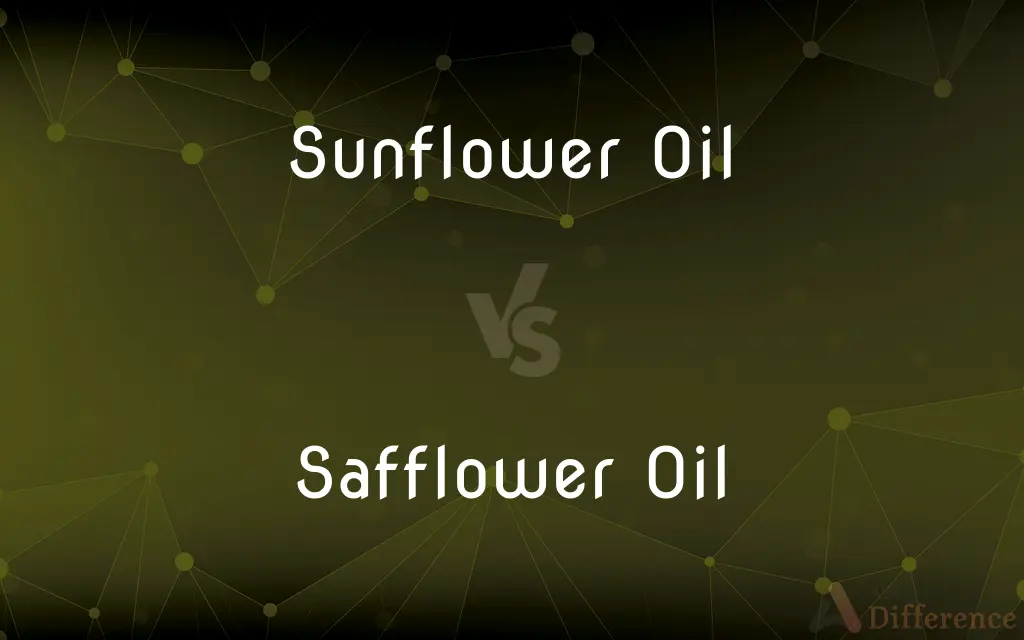Sunflower Oil vs. Safflower Oil — What's the Difference?
By Tayyaba Rehman — Published on November 15, 2023
Sunflower Oil, from sunflower seeds, is rich in Vitamin E; Safflower Oil, from safflower seeds, has high omega-6 content.

Difference Between Sunflower Oil and Safflower Oil
Table of Contents
ADVERTISEMENT
Key Differences
Sunflower Oil, derived from the pressed seeds of the sunflower plant, contains a high level of monounsaturated fats and Vitamin E, making it a healthy choice for cooking. In contrast, Safflower Oil, sourced from the seeds of the safflower plant, is notable for its high content of omega-6 fatty acids and a lower amount of saturated fat, which is beneficial for heart health.
Sunflower Oil often boasts a mild flavor and high smoke point, factors that make it versatile and popular for frying and various cooking methods. Conversely, Safflower Oil also has a high smoke point but typically a lighter taste, preferred for salad dressings and cold dishes where a neutral flavor is desired.
In terms of nutritional composition, Sunflower Oil provides a significant amount of Vitamin E, known for its antioxidant properties and positive effects on skin health. Safflower Oil, on the other hand, doesn't offer as much Vitamin E, but it's rich in unsaturated fats, particularly omega-6 fatty acids, which are important for overall health, though they should be balanced with omega-3s.
Sunflower Oil, when chosen as high-oleic, can be an excellent option for those seeking to increase monounsaturated fat intake, similar to the type found in olive oil. Safflower Oil, while also available in a high-oleic version, is more commonly recognized for its linoleic variety, which is higher in polyunsaturated fats.
Both Sunflower and Safflower Oils have shelf stability and storage properties that make them convenient for long-term use, but Sunflower Oil tends to have a longer shelf life due to its Vitamin E content, which naturally helps in preventing rancidity. Safflower Oil requires more careful storage, ideally in a cool, dark place to maintain its quality.
ADVERTISEMENT
Comparison Chart
Source
Derived from sunflower seeds
Derived from safflower seeds
Nutritional Content
High in Vitamin E and monounsaturated fats
High in omega-6 fatty acids
Flavor
Mild flavor
Light, neutral flavor
Common Use
Frying, cooking
Salad dressings, cold dishes
Types
High-oleic, linoleic
High-oleic, linoleic
Compare with Definitions
Sunflower Oil
Sunflower Oil is an edible oil extracted from sunflower seeds.
Sunflower Oil is commonly used in cooking because of its mild flavor.
Safflower Oil
Safflower Oil is high in polyunsaturated fats, specifically omega-6 fatty acids.
His doctor recommended Safflower Oil to balance his omega fatty acid intake.
Sunflower Oil
Sunflower Oil is characterized by its light yellow color and mild taste.
The chef chose Sunflower Oil to avoid overpowering the dish's natural flavors.
Safflower Oil
Safflower Oil comes in high-oleic and linoleic types.
She uses linoleic Safflower Oil for its potential health benefits.
Sunflower Oil
Sunflower Oil is known for its high Vitamin E content.
She buys Sunflower Oil specifically for its skin health benefits.
Safflower Oil
Safflower Oil is known for its potential to positively affect heart health.
He switched to Safflower Oil as part of his heart-healthy diet.
Sunflower Oil
Sunflower Oil has a high smoke point, making it suitable for frying.
He prefers using Sunflower Oil for frying crisps.
Safflower Oil
Safflower Oil has a neutral flavor and light consistency.
Safflower Oil was used to keep the dessert light and flavorful.
Sunflower Oil
Sunflower Oil is available in high-oleic and linoleic varieties.
For her diet, she chooses high-oleic Sunflower Oil.
Safflower Oil
Safflower Oil is an edible oil pressed from the seeds of the safflower plant.
Safflower Oil is her go-to for homemade salad dressings.
Common Curiosities
Is Safflower Oil good for heart health?
Yes, Safflower Oil, rich in unsaturated fats, is considered heart-healthy.
Does Sunflower Oil contain antioxidants?
Yes, Sunflower Oil is rich in Vitamin E, a powerful antioxidant.
Does Safflower Oil contain omega-3 fatty acids?
No, it's high in omega-6 fatty acids but contains minimal omega-3s.
Why is Safflower Oil a popular choice for cold dishes?
Its light, neutral flavor doesn't overpower the taste of other ingredients.
What's the main nutritional difference between Sunflower Oil and Safflower Oil?
Sunflower Oil is high in Vitamin E, while Safflower Oil is rich in omega-6 fatty acids.
Can Sunflower Oil be used for deep frying?
Yes, its high smoke point makes Sunflower Oil suitable for deep frying.
What is the smoke point of Sunflower Oil?
It has a high smoke point of approximately 440°F - 475°F (227°C - 246°C).
Does Safflower Oil have a strong flavor?
No, it's known for its light, neutral flavor.
What is Sunflower Oil commonly used for in cooking?
Sunflower Oil is used for frying and cooking due to its high smoke point and mild flavor.
How should Sunflower Oil be stored for maximum shelf life?
In a cool, dark place, tightly sealed to prevent oxidation.
Is Sunflower Oil considered healthy for daily consumption?
In moderation, especially the high-oleic variety, it can be part of a healthy diet.
Are there different types of Sunflower Oil?
Yes, mainly high-oleic and linoleic, differing in monounsaturated fat content.
Can I substitute Sunflower Oil for Safflower Oil in recipes?
Yes, they can be interchanged, but flavor and nutritional content may slightly differ.
Is Safflower Oil used in cosmetics?
Yes, due to its moisturizing properties, it's found in various cosmetic products.
Can people with nut allergies use Safflower Oil?
Generally, yes, but they should always consult with a healthcare provider first.
Share Your Discovery

Previous Comparison
Jackals vs. Coyotes
Next Comparison
Cheery vs. MerryAuthor Spotlight
Written by
Tayyaba RehmanTayyaba Rehman is a distinguished writer, currently serving as a primary contributor to askdifference.com. As a researcher in semantics and etymology, Tayyaba's passion for the complexity of languages and their distinctions has found a perfect home on the platform. Tayyaba delves into the intricacies of language, distinguishing between commonly confused words and phrases, thereby providing clarity for readers worldwide.













































